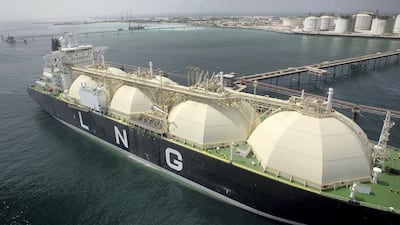Abu Dhabi National Oil Company's logistics and services subsidiary signed an agreement with Singapore's Atlantic Gulf & Pacific company to lease one of its liquefied natural gas (LNG) vessels.
The carrier Al Khaznah will be used as a floating storage unit (FSU) at the Karaikal LNG import terminal, which is located 320 kilometres south of the southern Indian city of Chennai.
The FSU will be leased over a period of 15 years from 2021 onwards, with the option of extending it for five years.
The vessel will meet the largely heavy industry gas requirements of both the union territory of Puducherry, where Karaikal is located, and the state of Tamil Nadu. The LNG terminal at Karaikal deepwater port is one of 11 terminals being developed in India, the world's fourth-largest importer of gas. The South Asian country plans to increase the share of gas in its energy mix to 15 per cent between 2020 and 2030, from 6.2 per cent at the end of 2019.
Karaikal will become the fourth terminal in the world to use an FSU after Malta, Malaysia and Bahrain.
Both Adnoc L&S and AG&P will look at providing a "comprehensive LNG solution" for downstream customers from the Karaikal facility, said Karthik Sathyamoorthy, president of AG&P Terminals.
The Singapore company, which is developing the 1 million-tonne-a-year LNG terminal at Karaikal said it was focusing on "bringing down the unit cost of regasification for smaller volumes".
The FSU that will deliver gas to consumers in India's south-east is one of eight LNG vessels operated by Adnoc L&S, which has a fleet of more than 120 carriers. Al Khaznah is currently on contract with Adnoc's LNG subsidiary, with the lease expected to end in 2021. The agreement with AG&P will extend its life by another 15 years, offering "a new revenue stream" to a vessel that would have been challenging to set up after 25 years of operations, Adnoc said.
The agreement "also maximises value from one of our maturing assets, while also providing AG&P with a flexible storage solution for their LNG terminal," said Adnoc Logistics & Services chief executive Captain Abdulkareem Al Masabi.
Al Khaznah is Japanese-made and was built in 1994 with a capacity of 137,540 cubic metres of LNG distributed across five International Maritime Organisation-type B tanks. At the time of its launch, it was one of the largest LNG carriers in the world.
Adnoc L&S was formed in 2016 after the merger of three Adnoc units and plans to add 25 vessels to its fleet over the next five years.
The subsidiary also plans to trial biofuel as a bunkering fuel for its fleet as it looks to use low-emission alternatives to comply with IMO regulations, Capt Al Masabi told The National earlier this month. The IMO has mandated for all vessels to reduce emissions of sulphur oxides to 0.5 per cent from 3.5 per cent, starting since January 1. Adnoc enforced the regulations across its entire fleet by November 2019, with the company now exploring other alternatives such as LNG, liquefied petroleum gas as well as blended biofuel to carry its vessels.


